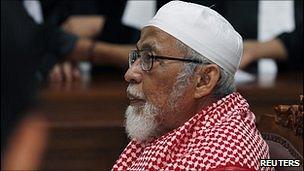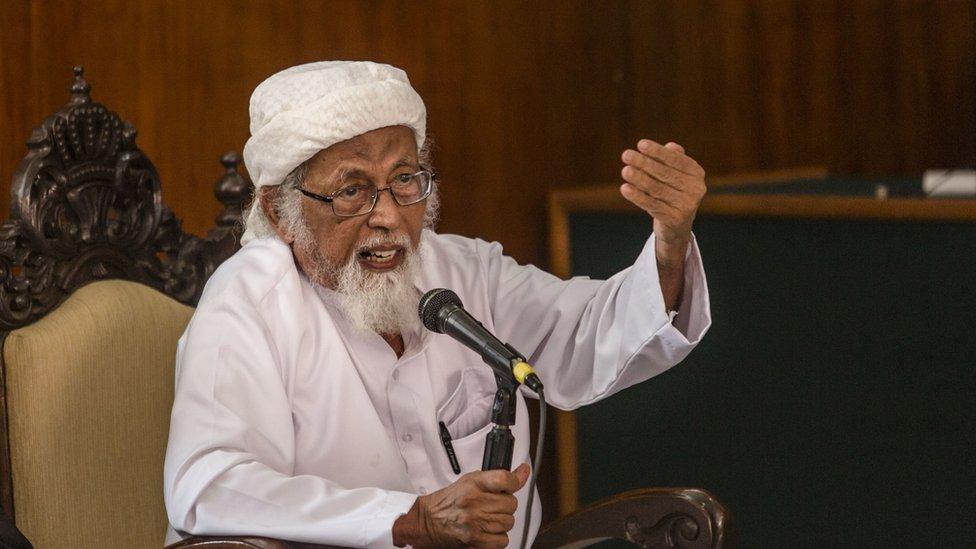Indonesia's Ba'asyir rejects 'made-up' charges
- Published

Abu Bakar Ba'asyir is facing terrorism-related charges for the third time
Indonesian radical Muslim cleric Abu Bakar Ba'asyir has rejected terrorism charges against him, as his trial resumed in Jakarta.
He is accused of having helped set up and fund an Islamic militant training camp in Aceh, uncovered last year.
The 72-year old has denied all links to any extremist activity - he maintains he is a spiritual, religious leader and that he has been unfairly accused.
If convicted, he could face the death penalty.
"I understand in principle that I am being accused of being the leader of a militant group in Aceh. Such allegations have been engineered and are just empty talk," he told judges after prosecutors read out a 93-page indictment against him.
Speaking in his cell before the trial hearing, he told reporters: "This is all made up... I did nothing. I was only defending Islam."
About 200 followers of Mr Ba'asyir packed the court and shouted Islamic slogans in Arabic during the proceedings. The hearing was later adjourned until Thursday.
Indonesian police say they have strong evidence to prove Mr Ba'asyir funded a new militant group that calls itself the Al-Qaeda in Aceh.
It is the third time Mr Ba'asyir has faced terrorism-related charges.
He was convicted of conspiracy in the 2002 Bali bombings, but the sentence was later overturned on appeal.
Police believe Mr Ba'asyir is the spiritual inspiration of extremist activities across Indonesia, says the BBC's Jennifer Pak at the court in Jakarta.
He was convicted of conspiracy in the 2002 Bali bombings, but the sentence was later overturned on appeal.
Correspondents say there are concerns that any conviction could spark a wave of sympathy among those who share his beliefs.
'Engineered by America'
Mr Ba'asyir was arrested in West Java by anti-terror police last August, six months after the discovery by police of a militant camp in Aceh.
Police say Mr Ba'asyir played an active role in setting up the camp, appointing key people and receiving reports from radicals in the field.
The charges against him include "mobilising people for acts of terror", which carries the death sentence.
Officials believe this group had plans to launch an attack in Indonesia similar to that in Mumbai, India, in November 2008, when Islamist militants killed 166 people.
Mr Ba'asyir denies having links to the Aceh camp, and says the allegations against him have been "engineered by America".
This is the first time he has been linked to the planning or creation of a terror network. In the past he has been linked to extremism in a spiritual and moral capacity - charges he has consistently denied.
Mr Ba'asyir had previously served 26 months in jail before being cleared of involvement with Jemaah Islamiah (JI), the group behind the 2002 Bali attacks.
He was also imprisoned for conspiracy over the bombings, in which 202 people died. However, his conviction was overturned and he was released in 2006.
He has been accused of giving spiritual leadership to JI, which has links to al-Qaeda - a claim he denies.
Mr Ba'asyir is the leader of the hardline Islamist group Jemaah Ansharut Tauhid (Jat), which was created in 2008.
It was described in a report by the Brussels-based think tank, International Crisis Group, external (ICG) as an "above-ground organisation" that embraced individuals with known ties to fugitive radicals.
Jat has denied it has any connection to extremism and insists it is a legitimate Islamic organisation.
- Published8 January 2021

- Published9 August 2010